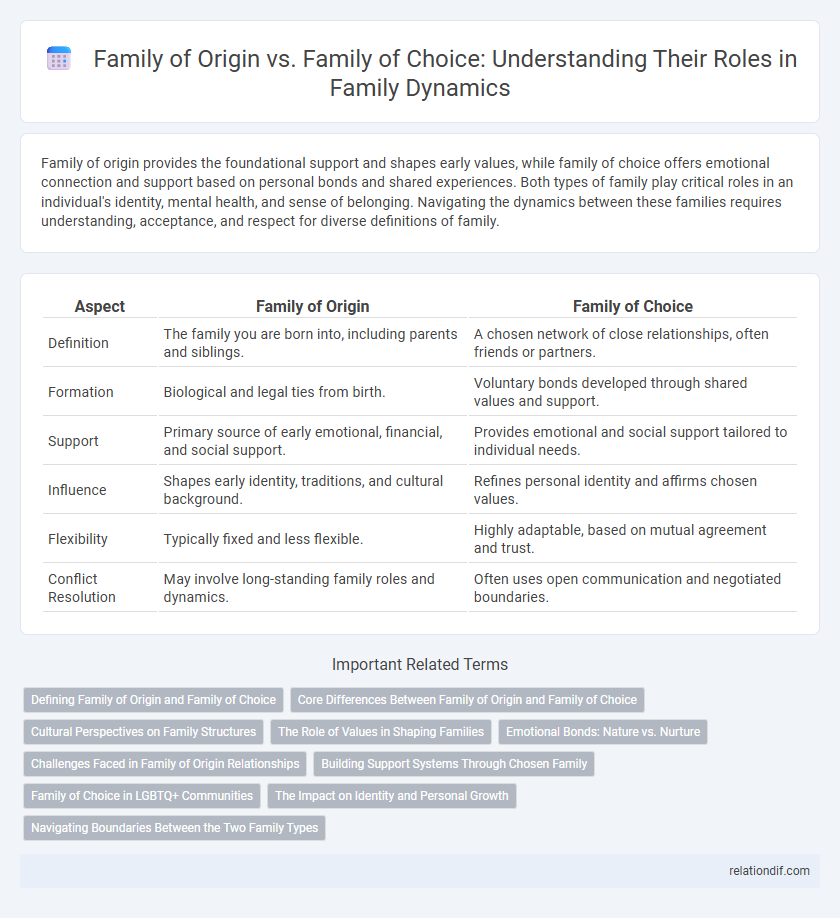Family of origin provides the foundational support and shapes early values, while family of choice offers emotional connection and support based on personal bonds and shared experiences. Both types of family play critical roles in an individual's identity, mental health, and sense of belonging. Navigating the dynamics between these families requires understanding, acceptance, and respect for diverse definitions of family.
Table of Comparison
| Aspect | Family of Origin | Family of Choice |
|---|---|---|
| Definition | The family you are born into, including parents and siblings. | A chosen network of close relationships, often friends or partners. |
| Formation | Biological and legal ties from birth. | Voluntary bonds developed through shared values and support. |
| Support | Primary source of early emotional, financial, and social support. | Provides emotional and social support tailored to individual needs. |
| Influence | Shapes early identity, traditions, and cultural background. | Refines personal identity and affirms chosen values. |
| Flexibility | Typically fixed and less flexible. | Highly adaptable, based on mutual agreement and trust. |
| Conflict Resolution | May involve long-standing family roles and dynamics. | Often uses open communication and negotiated boundaries. |
Defining Family of Origin and Family of Choice
Family of origin refers to the nuclear family where an individual is raised, including parents and siblings who shape early development and identity. Family of choice encompasses close relationships formed beyond biological ties, often including friends, mentors, or partners that provide emotional support and a sense of belonging. Defining these concepts highlights the contrast between inherited family structures and self-selected support networks essential for personal well-being.
Core Differences Between Family of Origin and Family of Choice
Family of origin refers to the biological or adoptive family into which a person is born, shaping early experiences, values, and identity development. Family of choice consists of individuals selected based on emotional bonds, mutual support, and shared values, often providing acceptance and belonging absent in the family of origin. Core differences include the basis of connection--biological versus voluntary--and the roles these families play in emotional support, identity formation, and social support systems.
Cultural Perspectives on Family Structures
Cultural perspectives on family structures highlight significant differences between family of origin and family of choice, reflecting diverse social norms and values across societies. In collectivist cultures, family of origin remains central, with strong emphasis on blood relations and intergenerational responsibilities, while individualistic cultures often prioritize family of choice, recognizing chosen bonds based on emotional support and shared values. Understanding these cultural distinctions is crucial for appreciating varying definitions of kinship, caregiving roles, and social support systems worldwide.
The Role of Values in Shaping Families
Values fundamentally shape both families of origin and families of choice by guiding behavior, decision-making, and emotional bonds. In families of origin, inherited cultural, religious, and moral values create a foundational identity that influences individual growth. Families of choice develop their own distinct values consciously, often reflecting shared beliefs and mutual respect that reinforce cohesion and support.
Emotional Bonds: Nature vs. Nurture
Emotional bonds in family of origin often stem from biological ties and early developmental experiences, deeply influencing attachment styles and emotional responses. Family of choice, formed through shared values and mutual support, nurtures emotional connections through intentional interactions and trust-building. Both nature and nurture interplay, shaping the depth and resilience of these bonds across diverse family structures.
Challenges Faced in Family of Origin Relationships
Challenges in family of origin relationships often include unresolved conflicts, differing values, and emotional baggage that can strain bonds. These difficulties may impact an individual's sense of identity and influence their capacity to form healthy family of choice connections. Understanding and addressing these issues is crucial for personal growth and establishing supportive chosen family networks.
Building Support Systems Through Chosen Family
Building support systems through chosen family strengthens emotional resilience by fostering connections based on mutual understanding and shared values rather than solely on biological ties. Chosen families provide reliable networks for mental health support, caregiving, and social validation, often filling gaps left by family of origin. Establishing these intentional relationships enhances overall well-being and creates inclusive spaces where individuals feel genuinely accepted.
Family of Choice in LGBTQ+ Communities
Family of choice in LGBTQ+ communities serves as a vital support system, offering acceptance and understanding absent from some individuals' families of origin. These families often consist of close friends, partners, and mentors who provide emotional resilience, stability, and solidarity in navigating social challenges. Research highlights that strong family of choice networks correlate with improved mental health outcomes and increased feelings of belonging within LGBTQ+ individuals.
The Impact on Identity and Personal Growth
The family of origin shapes foundational identity through early experiences, cultural heritage, and inherited values that influence self-perception and emotional development. In contrast, the family of choice fosters personal growth by allowing individuals to actively select supportive relationships aligned with their evolving beliefs and aspirations. Navigating both families enhances self-awareness and resilience, promoting a more adaptable and integrated sense of identity.
Navigating Boundaries Between the Two Family Types
Navigating boundaries between family of origin and family of choice requires clear communication and mutual respect to maintain individual identity while fostering strong connections. Balancing cultural expectations from family of origin with the values and dynamics of family of choice helps prevent conflicts and supports emotional well-being. Establishing boundaries around time, emotional support, and decision-making promotes healthy relationships across both family types.
family of origin vs family of choice Infographic

 relationdif.com
relationdif.com